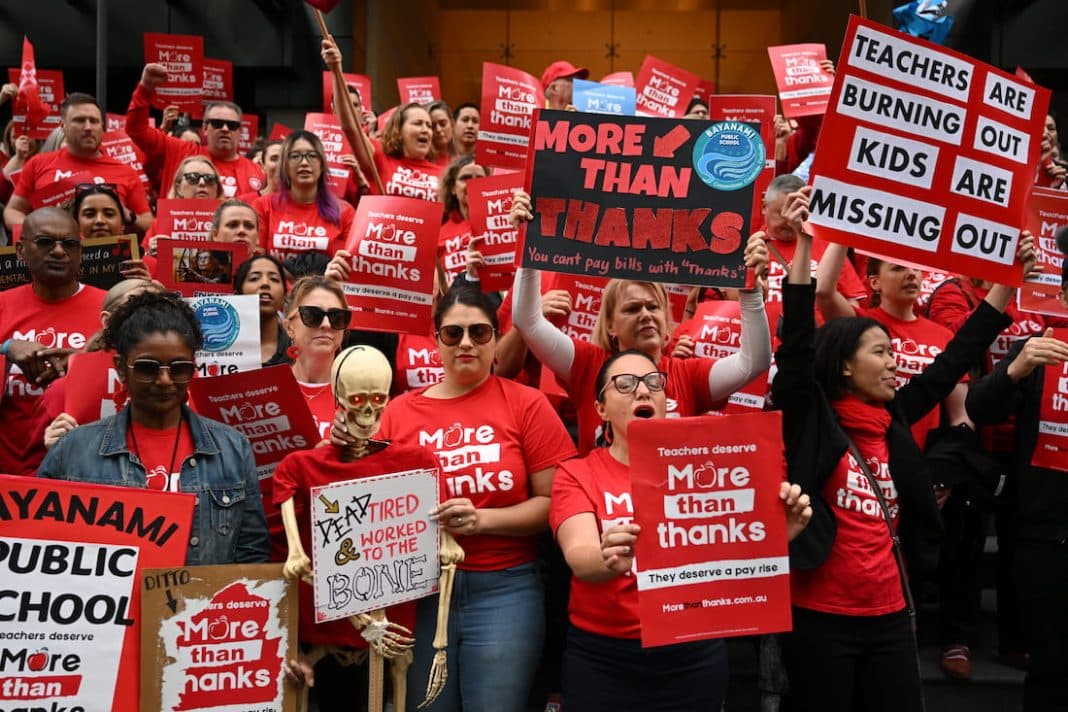A pay decision for NSW teachers handed down by the industrial umpire has been called an “insulting” pay cut by union officials, in the context of inflation.
The Industrial Relations Commission made its decision to deliver NSW teachers a backdated pay rise of 2.5 per cent for 2022, and a three per cent pay rise from January 1, 2023.
Teachers will also be given a one-off payment equal to 0.25 per cent of their salary, paid once the award is finalised.
Education Minister Sarah Mitchell welcomed the new wages policy, which will affect about 90,000 teachers, after months of industrial unrest and strikes in the sector.
Ms Mitchell urged the unions to begin working with the government following the decision.
“Making sure our teachers receive the maximum increases they are eligible for has been a focus for me and the NSW government,” Ms Mitchell said in a statement on Friday.
“I hope the Teachers Federation will now begin working with us on improving outcomes for our students.”
Head of the NSW Teachers Federation Angelo Gavrielatos slammed the decision, saying in the current inflationary environment teachers had effectively had their pay cut.
“The fact that government has persevered with its insulting salary cap when inflation is at 7.3 per cent speaks volumes in regard to its respect for the profession,” Mr Gavrielatos told AAP.
“(It comes) at a time when we have incredible teacher shortages, a teacher crisis, which will only worsen as a result of this decision.”
A major sticking point during negotiations between the government and the unions had been a legislated wage cap of 2.5 per cent on teachers’ salaries – which the commission was unable to rule against.
Mr Gavrielatos accused the government of presiding over a looming teacher crisis, and said Premier Dominic Perrottet would be judged at the upcoming March state election.
“The teacher shortage and the crisis that we now face, where students have been denied their learning, will be elevated as an election issue,” he said.
“This will be an issue where the Perrottet government will be judged at the election box, because of the crisis it’s created.”
The decision was also criticised by the NSW/ACT branch of the Independent Education Union, which represents 32,000 Catholic school teachers and staff.
While not bound by them, Catholic employers have a history of imposing government wages policy onto non-government schools, the Catholic teachers union says.
“The IEU condemns these derisory increases – they are not enough for IEU members nor for members of the NSW Teachers Federation,” Branch Acting Secretary Carol Matthews said.
“Teachers’ salaries have been falling relative to other professions for more than a decade now and this year’s intensifying cost-of-living pressures only make matters worse.”
The deal was fair for teachers and stayed in line with the government’s newly-developed wages policy, which rewards “productivity-enhancing reforms” with higher pay, Employee Relations and Finance Minister Damien Tudehope said.
Mr Tudehope said he was proud of the pay rise given to teachers, noting it was higher than the two per cent recently offered to Victorian educators.



